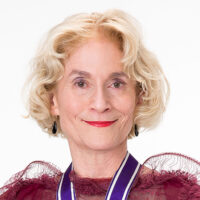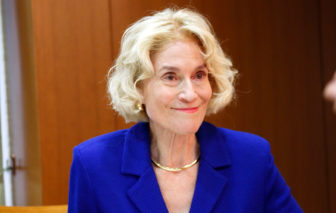
2016 Kyoto Prize Laureates
Thought and Ethics
/ Philosopher
1947 -
Ernst Freund Distinguished Service Professor of Law and Ethics, The University of Chicago
Philosophy in the Service of Humanity
2016
11 /11 Fri
Place:Kyoto International Conference Center
Emotions and Cosmopolitanism
2016
11 /12 Sat
14:00 - 17:30
Place:Kyoto International Conference Center
Dr. Nussbaum introduced the notion of incorporating human capabilities (what each person is able to do or be) into the criteria for social justice, beyond the conventional theory of equality based on a social contract among rational individuals. She established a new theory of justice that ensures the inclusion of the weak and marginalized, who are deprived of opportunities to develop their capabilities in society, and has proposed ways to apply this theory in the real world.
Dr. Martha Craven Nussbaum has led global discourse on philosophical topics that influence the human condition in profound ways, including contemporary theories of justice, law, education, feminism and international development assistance. She strives to present ethics that effectively promote human welfare amid an environment of globally changing social conditions that often produce conflict in values and emotions.
Among her best-known achievements is the development of a political philosophy that focuses on human capabilities. Over many years, Dr. Nussbaum worked with Dr. Amartya Sen, an Indian economist who attempted to reintegrate philosophy and economics and advocated a capability approach to human well-being. Dr. Nussbaum’s version of the “capabilities approach” was created by developing the results of their collaborative research in a unique way. She has advocated a new idea: that the normative justice should focus on the development of capabilities—what each individual is able to do or be—so people can unlock their potential and flourish. Under the capabilities approach, for example, poverty is reinterpreted as capability deprivation rather than a mere lack of money. Using this theory, Dr. Nussbaum has injected new insights into the discussion of human welfare policy and forms of assistance to developing countries.
Dr. Nussbaum has articulated a broad set of human capabilities that includes the inviolability of good health and bodily integrity, the free movement of imagination and critical thinking, and concern for other people and other species. Her list of capabilities is cited around the world as a normative theory for human rights education—and a base of assessment of human development and a foundation for public policy in areas ranging from child welfare to gender equality. She has attracted global attention for advocating liberal education as the foundation of democracy, and multicultural awareness as a path toward harmony among people of diverse cultures while she has engaged in in-depth discussion with people from different cultural backgrounds, particularly in India.
Dr. Nussbaum has devoted particular effort to researching the emotional origins of laws, and her conclusions influence penal policy and related legislation. She has analyzed the nature of negative emotions, such as anger, disgust and shame, reviewed many cases to examine how human vulnerability is connected to crime and penalties. Amid growing intolerance and discrimination against dissimilar others, her work offers practical significance by identifying the underlying causes of problems and providing new pathways to solutions.
Dr. Nussbaum has led contemporary studies in social philosophy and ethics toward a future of greater human well-being, continuously applying her findings to some of today’s most vexing social concerns. Maintaining a strong sense of mission, she continues to seek ways of promoting the harmonious coexistence of different cultures and restructuring the public sphere.
For these reasons, the Inamori Foundation is pleased to present the 2016 Kyoto Prize in Arts and Philosophy to Dr. Martha Craven Nussbaum.
Profile is at the time of the award.

The 2022 Balzan Prizes Are Awarded to Dr. Nussbaum and Dr. Langer!
On September 12, 2022, Dr. Martha Craven Nussbaum , the 2016 Kyoto Prize laureate in Arts and Philosophy, and Dr. Robert Samuel Langer , the 2014 Kyoto Prize laureate in Advanced Technology, were selected as the recipients of the Balzan Prize. This prize honors internationally recognized scholars for their outstanding achievements in the natural sciences...

The 2021 Holberg Prize is awarded to Dr. Martha Craven Nussbaum!
On March 5, 2021, Dr. Martha Craven Nussbaum , the 2016 Kyoto Prize laureate in Arts and Philosophy, was selected as the recipient of the Holberg Prize which honors scholars who have made outstanding contributions to research in the humanities, social sciences, law or theology. Many congratulations on this prestigious recognition! Dr. Nussbaum introduced the...

Prof. Nussbaum is awarded the 2018 Berggruen Prize.
On October 30, 2018, the Berggruen Institute in Los Angeles, California announced its selection of Martha C. Nussbaum as the winner of the 2018 Berggruen Prize for Philosophy & Culture.